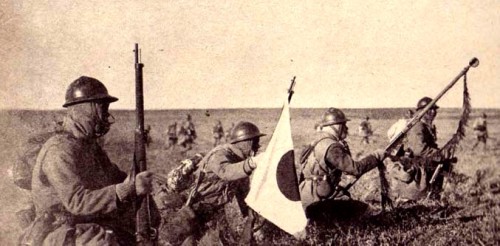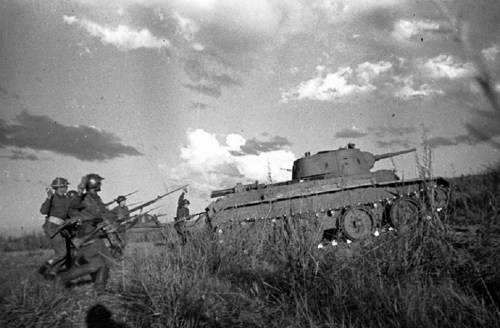The Soviet Invasion of Manchuria, Part I — The Rising Sun and the BearIn 1930 China was in tur
The Soviet Invasion of Manchuria, Part I — The Rising Sun and the BearIn 1930 China was in turmoil as the country was divided among a number of warlords who controlled their own independent realms. On the pretext of defending an important Japanese built railway in the region of Northeast China called Manchuria, the highly imperialistic Japanese government stationed the Kwantung Army to protect it. The Kwantung Army was the elite force of the Japanese Army, and perhaps the most prestigious command of in the Japanese military. Although under the authority of Japanese High Command, the Kwantung Army had a mind of its own as it was staffed by officers who sought power, wealth, and glory. In 1931 the Kwantung Army conducted a false flag operation where they bombed the railway they were guarding. Blaming the bombing on a local warlord, they used the incident as a pretext to invade and conquer all of Manchuria. The forces of the local warlord, although larger than the Kwantung Army, were no match for the organization and professionalism of the Japanese. Within five months, the Kwantung Army had defeated the Chinese and conquered Manchuria. They created a puppet stated called “Manchuko”, which was ruled by a puppet emperor from the former Chinese Manchu Dynasty. Incredibly, the Kwantung Army did all of this without any orders from the Japanese government.Throughout the 1930’s Japan continued to expand into Chinese territory. By the late 1930’s Japan also sought to expand into the Soviet Union, hoping to gain possession of the rich oil and gas fields of Siberia. In the summer of 1938, a series of clashes between Japanese and Soviet forces occurred near Lake Khazan near Vladivostok. Then in 1939, the Kwantung Army attempted a full scale invasion of the Soviet Union and her ally, Mongolia. The two armies met at a river called Khalkin Gol on May 11th, 1939.The Japanese invaded with a massive force composed of 75,000 men of the 6th Japanese Army, a unit of the Kwantung Army. Throughout the summer of 1939, the Japanese assaulted Soviet-Mongolian lines, but had little success. Then a large Soviet force led by future marshal Georgy Zhukov arrived with a heavily mechanized army. While the Japanese prided themselves on their courageous infantry, throughout World War II they always lacked armored forces. In addition Japanese tanks were of typically light armed and armored light tanks. Japanese tanks also had the reputation as being the among the worst tanks produced during the war. By contrast, the Soviets had a reputation for producing some of the best tanks of the war. The pathetic tanks of the Japanese Army were no match for the steel behemoths of the Soviet Red Army.At the Battle of Khalkhin Gol the Japanese brought 135 tanks 250 aircraft. Georgy Zhukov brought 500 tanks, hundreds of vehicles, and over 800 aircraft. In late August, he conducted a massive counterattack lead by three tank brigades and 50,000 infantry. The Red Army easily swept the Japanese air force from the skies, while simultaneously bombing Japanese defensive positions and supply lines. Soviet tank units made mincemeat of the Japanese armored forces while smashing through the flanks of the Japanese. Once the Japanese flanks were destroyed, Soviet infantry encircled and surrounded the Japanese. Zhukov demanded the Japanese surrender, but the Japanese commander, Michitaro Kumatsubara, announced that he would fight to the death. Over the next several days Soviet artillery and aircraft pounded the Japanese as the Red Army tightened its noose around the encircled army. It seemed that within a matter of days the 6th Army would be wiped out. Then in August, 1939 it was announced that Stalin signed a non-aggression pact with Germany, and since Japan was Germany’s ally, they were required to make peace with the Soviets. In essence, the Japanese had been saved by the bell.The Battle of Khalkhin Gol was the biggest ass whoopin’ dealt to the Japanese until the Battle of Midway in 1942. Afterwards, the Japanese signed a separate non-aggression pact with the Soviet Union, pretending that the whole thing had never happened.As a result of the Battle of Khalkhin Gol, the Japanese chose not to intervene when Germany invaded the Soviet Union, then the Soviet Union overran and destroyed Germany. However, a promise between Joseph Stalin and Franklin D. Roosevelt guaranteed that the Soviet Union and Imperial Japan would clash once again.To be Continued… -- source link
Tumblr Blog : peashooter85.tumblr.com
#history#wwii#soviet union#japanese history#manchuria#mukden incident#kwantung army#red army#soviet army



